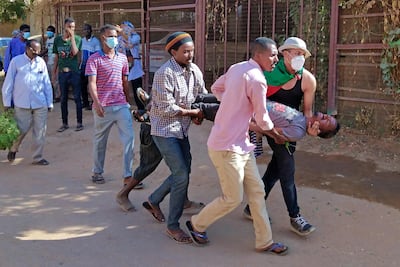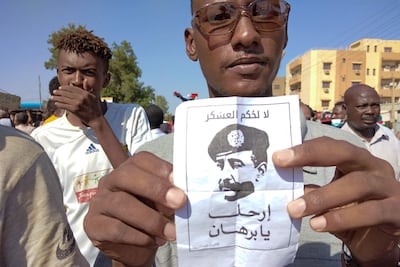Clashes between police and demonstrators continued on Thursday in the Sudanese capital Khartoum, a day after at least 15 protesters were shot dead by security forces in the deadliest day since the military seized power last month.
Police fired tear gas to disperse scores of anti-coup protesters who had stayed out on the streets of Khartoum overnight, unfazed by an intensifying crackdown by authorities that has drawn international condemnation.
Police tore down makeshift barricades the protesters had erected the previous day in the area of Khartoum North, where most of the fatal shootings had taken place the previous day.
There were no immediate reports on whether anyone was killed in Thursday’s violence.

Wednesday’s fatalities took to about 40 the total number of protesters killed since the October 25 coup that derailed Sudan’s transition to democratic rule after the removal in April 2019 of dictator Omar Al Bashir. More than 500 others have been wounded, some seriously.
Medics linked to the pro-democracy movement say many of the dead and wounded suffered gunshot wounds. Army soldiers and snipers widely suspected to be security agents were blamed for the use of live ammunition.
The UN rights chief on Thursday condemned the Sudanese security forces' use of live ammunition against the protesters on the previous day and called on the military and security forces to stop the use of “unnecessary and disproportionate” force.
"It is utterly shameful that live ammunition was again used yesterday against protesters," UN High Commissioner for Human Rights Michelle Bachelet said in a statement.
"Shooting into large crowds of unarmed demonstrators, leaving dozens dead and many more injured, is deplorable, clearly aimed at stifling the expression of public dissent and amounts to gross violations of international human rights law," Ms Bachelet added.
More than 100 others were wounded, including 80 who sustained gunshot wounds to their upper bodies and heads, the UN rights office said, citing reliable medical sources.
Army chief and coup leader Gen Abdel Fattah Al Burhan has denied the involvement of the military in the killings. Police say they tend to use tear gas and rubber bullets.
Some neighbourhood resistance committees in Khartoum, responding to the latest violence, vowed on Thursday to wage an “open-ended” campaign of protests until the military steps aside.
"Now we are making consultations among the resistance committees about upping the escalation against the coup," a senior member of the committees told Reuters, speaking on condition of anonymity.
The committees were the engine and chief organiser of the four months of street protests in 2018 and 2019 that forced the military to oust Al Bashir.

Gen Al Burhan, Sudan's de facto leader since the overthrow of Al Bashir’s 29-year regime, dismissed the civilian-led government of career UN economist Abdalla Hamdok, placed him under house arrest and detained members of his Cabinet. He has also declared an indefinite state of emergency.
Last week, he appointed himself the country’s leader at the head of a 14-member ruling council made up of generals, former rebel leaders and little-known civilians. The appointment of the Sovereign Council has significantly complicated several mediation bids to resolve the deepening political crisis.
Briefing reporters on a plane from Nairobi to Abuja during a visit to Africa by US Secretary of State Antony Blinken, a senior State Department official struck an optimistic note on Sudan: "Everybody, it seems to me, wants to find a way back, which is not the feeling I think you would get from the outside." He did not elaborate.
This week, US Assistant Secretary of State for African Affairs Molly Phee met separately with Gen Al Burhan and Mr Hamdok in a bid to find a way out of the crisis.
Gen Al Burhan has vowed to hold elections in 2023, reiterating to Ms Phee in their Tuesday meeting that his actions aimed to "correct” the democratic transition.
He has yet to name a new Cabinet, something that has widely been interpreted to indicate the general's continuing hope to strike a deal with his civilian critics on the way forward.
However, the excessive use of force by security forces in the three weeks since the coup has left many Sudanese seething and unwilling to accept Gen Al Burhan's leadership of the transition.
The coup has drawn international condemnation and a series of punitive measures, as well as the suspension of hundreds of millions of dollars’ worth of aid.
"We condemn violence towards peaceful protesters and call for the respect and protection of human rights in Sudan," the US State Department's Bureau of African Affairs said on Twitter.
Commenting on Wednesday’s violence, police said they had recorded only one death among protesters and that 30 others suffered breathing difficulties from tear gas.
They said they had fired no live rounds and used only "minimum force", even as 89 officers were wounded, some of them critically.
The latest rallies were organised despite a shutdown of internet services since the takeover and severe disruption of telecoms systems across Sudan. Telephone lines were restored on Thursday morning but the internet remained down.
AFP and Reuters contributed to this report

